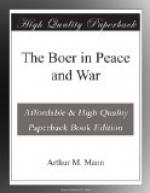It may be interesting to pause for a moment and look at the collections. The poorer classes besiege the stores on Saturday with anxious inquiries for ‘stickeys,’ i.e., threepenny-pieces. To a poor man with a large family of church-goers this matter of church collections is a serious business unless he can get four mites out of a shilling, as coppers are not used in the Transvaal; but I have known men of good standing inquire as eagerly for the despised threepenny-piece. When special collections are called for, in aid of a new organ fund, for instance, the results are rather surprising. In one instance the combined special collections on a Nachtmaal Sunday amounted to a little over L500, with a congregation of only 400. This points to the fact that there is money enough in the country, and it only requires a church collection to prove it.
It is to be regretted that the Boer does not devote a little more attention to the education of his children. If there happens to be a school anywhere near his farm, he does not mind taking advantage of this with a view to ‘teaching the young idea how to shoot’; but perhaps he takes too literal a view of this adage. His chief care is to see that his boys are taught to shoot straight, and he does not attach so much importance as he might to the three R’s. The Boer who can afford such luxuries engages a tutor for his children, but tutors are mostly of the English persuasion. They have not yet learned to appreciate the language of the country, and this constitutes a serious barrier. Again, one does not expect much of a country school, and the majority of the men who preside over these institutions in the Dutch Republics are there simply because they can obtain no more lucrative an occupation. A number of Free State farmers invariably ‘trek’ to Natal with their families and stock during the winter months, and this affords an opportunity for placing the children at more advanced schools; but then again the objection is serious—the masters are English.
[Illustration: Bloemfontein.]
In the town of Bloemfontein, Orange Free State, where the Volksraad thunders forth its mighty convictions, there is a model Young Ladies’ College. It seems that one day recently the members of the Raad found themselves in want of debatable motions, and it fell to the lot of one of their number to save the situation. That member directed the attention of his brethren to a certain question affecting the proper conduct of the Young Ladies’ College aforesaid. It had come to his knowledge that the Principal of the College had granted, to certain of the pupils who desired it, permission to pray to Almighty God in the English language. The member forcibly contended that this lamentable state of affairs should not exist, but that every pupil in the College should be compelled to pray to God in the language of the country! A general discussion followed, but it was ultimately allowed that this matter did not come within the jurisdiction of that Raad.




